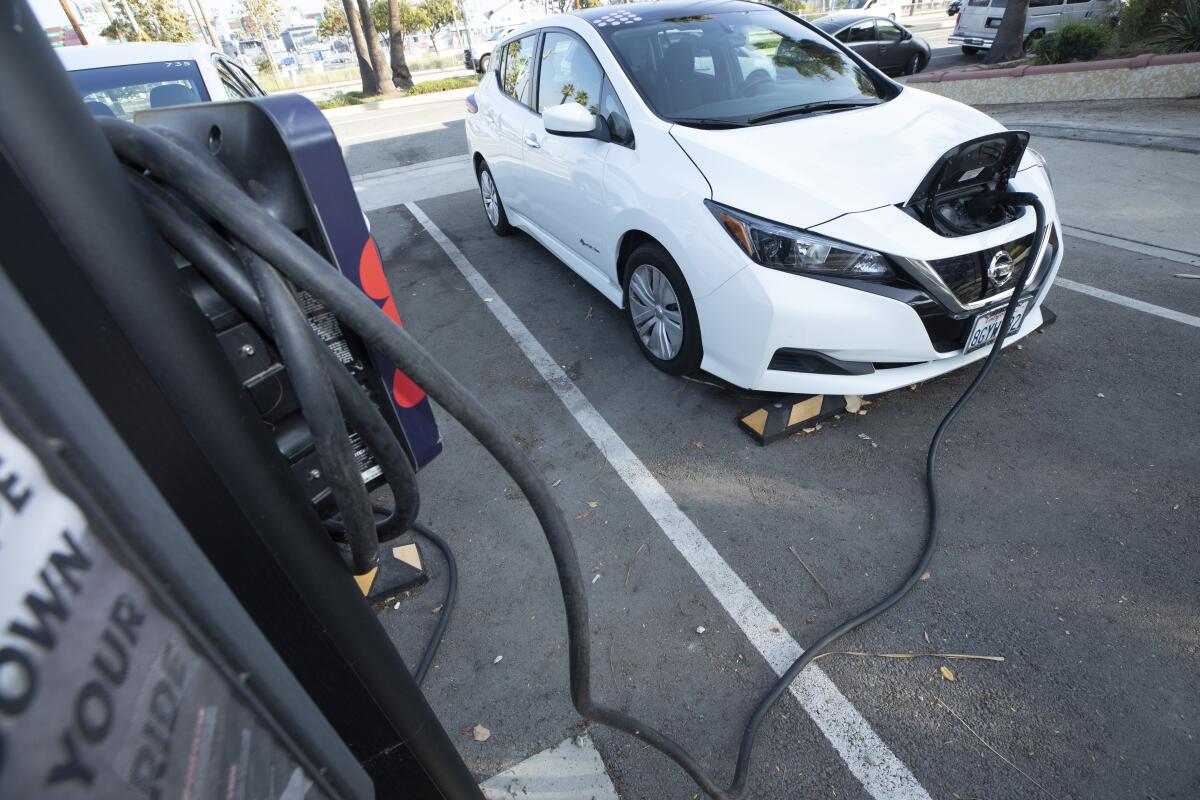Letters to the Editor: Electric cars aren’t a climate change panacea. We need to drive less

- Share via
To the editor: Electric cars shouldn’t be regarded as the silver-bullet solution to lowering automobile emissions. While they don’t run on gas, their batteries create their own set of environmental problems. (“California isn’t on pace to meet its climate targets. Here are 3 ways to cut pollution faster,” editorial, Dec. 19)
What we need is to use our cars less. We have to stop looking at cars as the only viable option to get from Point A to Point B. We can start by carpooling to work, taking the bus to run an errand and riding a bike for short trips.
A few tweaks in our driving habits can go a long way toward reducing our carbon footprint, electric or not.
Kristen Kessler, Ventura
..
To the editor: Your editorial is correct that California is falling behind in the fight against climate change. As you mention, we need bold initiatives to replace fossil fuel energy with renewable energy every place we can as soon as possible.
Renewable electricity is key. The California Public Utilities Commission is proposing new rates that will discourage the adoption of rooftop solar installation. I don’t believe the commission or the private utilities are up to the renewable challenge with their business-as-usual playbook. Here are some measures I think are needed.
— Make solar available to all, including renters, through programs of community solar, microgrids and virtual net energy metering.
— Every new electric vehicle should be equipped to supply energy back to the grid. They could charge during the day, and discharge a portion when needed.
— Every new appliance that draws a significant amount of power should be equipped with a controller that could intelligently turn off the appliance if the grid is suffering a power shortage.
These measures will enhance grid resilience and save the utilities on capital investment, which in turn will save customers money.
Wayne Morgan, Ventura
..
To the editor: There seems to be a delusion among those who formulate climate policy that if they set a pollution reduction mandate, it will surely happen.
The mandates and targets never have the supporting, well-conceived, detailed plan for how to reach the goals. Broad guidelines like “increasing the percentage of zero-emission vehicles sold” are made, but they rarely have the how-to specifics.
The populace gives lip service to climate goals while legislators avoid the draconian measures that would be required.
Let’s face it: There is no way that California will meet its legal mandate to cut emissions 40% below 1990 levels by 2030.
Glynn Morris, Playa del Rey
..
To the editor: As your story shows, Alaska is just another bellwether ecosystem signaling irreversible climate change. Everyone alive now lives somewhere that used to be something else.
We have been in a period of picking winners and losers for some time now. This is what authoritarians and oligarchs like best: a sure thing. Wealth is immune to ecosystem collapses, and the shrinking few that control the wealth have no fiscal impetus to change.
Alaska is only interesting to them if the Arctic melts enough to make oil extraction cheap.
Pam Brennan, Newport Beach





